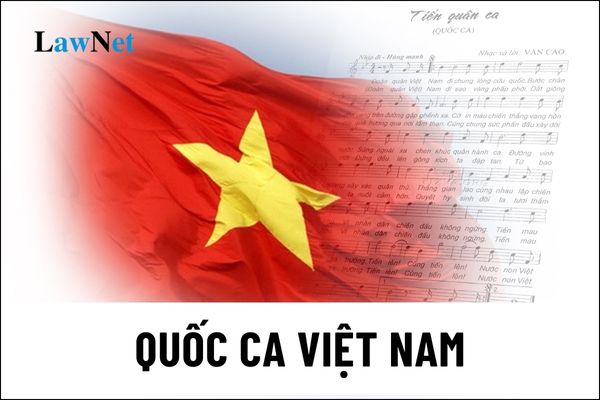At what grade do students in Vietnam start to learn to sing the national anthem of Vietnam?
At what grade do students in Vietnam start to learn to sing the national anthem of Vietnam?
Based on Subsection 2, Section 5 of the General Education Curriculum for the Music subject issued in conjunction with Circular 32/2018/TT-BGDDT, first-grade students will listen to the Vietnamese National Anthem, and third-grade students will learn to sing the Vietnamese National Anthem.
Additionally, with regard to the subject content, based on the required competencies and music education content for each educational level, the Music subject curriculum determines the educational content and expected requirements for each grade.
The requirements for each grade not only specify the expectations for each educational level but also reflect the educational outcomes associated with each specific educational content and topic.
Each subsequent grade has progressively higher expectations while incorporating the requirements of the previous grades.
Some requirements, despite being repeated across multiple or all grades, are tied to specific educational content and topics, thus demonstrating a higher level for the subsequent grade compared to the previous one.

At what grade do students in Vietnam start to learn to sing the national anthem of Vietnam? (Image from the Internet)
What are the characteristics of the Music subject in the 2018 General Education Curriculum in Vietnam?
According to Section 1 of the General Education Curriculum for the Music subject issued in conjunction with Circular 32/2018/TT-BGDDT, the characteristics of the Music subject in the 2018 General Education Curriculum are as follows:
Music is an art form that uses sounds to express human emotions, attitudes, perceptions, and thoughts.
Music is an essential part of cultures, closely connected to, and profoundly influencing social life.
Music enriches the spiritual values of humanity, serving as a medium that helps people explore the world, thereby enhancing the quality of life.
In schools, music education provides students with the opportunity to experience and develop musical competencies—manifestations of aesthetic competence—with the following components: musical performance, music appreciation and understanding, music application, and creation; contributing to the discovery and nurturing of students with musical talent.
Furthermore, through the content of songs, musical activities, and educational methods of the pedagogue, music education helps develop in students the qualities of patriotism, compassion, diligence, honesty, responsibility, along with self-control and self-learning abilities, communication and collaboration skills, problem-solving, and creativity to become well-rounded citizens with harmonious physical and mental development.
In the general education curriculum, the content of the Music subject is divided into two phases.
Basic Education Phase: Music is a compulsory subject from grade 1 to grade 9, covering basic knowledge and skills in singing, musical instruments, listening to music, music theory, and music appreciation.
The music education curriculum helps students experience, explore, and express themselves through musical activities aimed at developing aesthetic abilities, realizing the diversity of the musical world and the interrelationship between music and culture, history, and other art forms; at the same time, fostering an awareness of protecting and promoting traditional musical values.
Career Orientation Phase: Music is an elective subject based on students' preferences and career orientations.
The subject content includes expanded and advanced knowledge and skills in singing, musical instruments, listening to music, music theory, and music appreciation.
Students with interests, talents, or career orientations related to music may choose additional study topics.
Music education content in this phase helps students continue developing practical skills, expand their understanding of music in relation to cultural, historical, and social factors, apply knowledge to life, meet personal interests, and approach music-related careers.
What is the perspective on developing the Music subject curriculum in Vietnam?
According to Section 2 of the General Education Curriculum for the Music subject issued in conjunction with Circular 32/2018/TT-BGDDT, the Music subject curriculum adheres to the basic regulations outlined in the General Curriculum, including:
General orientations for all subjects (perspectives, objectives, required competencies, educational plans, and educational content orientations, teaching methods, and assessment of educational outcomes, implementation conditions, and program development); orientations for developing the Music subject curriculum at three educational levels.
Furthermore, stemming from the subject's characteristics, the following perspectives are emphasized in curriculum development:
(1) The curriculum focuses on developing students' musical competencies, manifestations of aesthetic competence in the field of music through practical, basic, and relevant educational content; emphasizing practice; contributing to the harmonious development of virtues, intellect, physicality, and aesthetics and career orientation for students.
(2) The curriculum inherits and promotes the strengths of the current Music subject curriculum while absorbing the experience of curriculum development from some advanced education systems around the world.
The educational content of the curriculum is designed to combine both concentric and linear approaches; clearly reflecting the artistic features of music and the national cultural identity; highly integrated in the lower grades and gradually differentiated in the higher grades.
(3) The curriculum develops diverse learning activities, with rich content and forms to cater to students' needs and interests; creating emotions, joy, and excitement in learning.
(4) The curriculum ensures core educational content consistency nationwide while being flexible to accommodate the diverse learning conditions and abilities of students across different regions.

